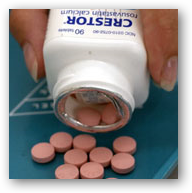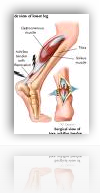The Jupiter study was one that literally shook up healthcare and one of the potential side effects is diabetes and muscles that hurt with the use of statins, but it appears the FDA says it’s ok for our muscles to hurt as you are going to lower your odds of heart disease, so us as patients need to have this discussion now to figure  out if this is right for us, an individuals.
out if this is right for us, an individuals.
FDA Committee Agrees With Wider Use of Crestor – Is The Jupiter Study Data Creeps Up Once Again
If you are not familiar with the Jupiter report and how this all came about, a fellow blogger, the Happy Hospitalist was kind enough to lay it out for us with his thoughts on how one treatment has the potential to lead to other drug treatments, so again we are back to the patient/doctor conversation about whether or not Crestor and statins are the answer and what the risk of developing diabetes could be. The muscle pain seems to be pretty well documented all over the web from patients who have experienced this side effect.
The Jupiter Report with Crestor – What Side effects?
Many physicians recommend taking an enzyme called COQ10, which is naturally found in our systems and with a supplement as I understand it, this helps the body create additional supplies of the enzyme in our system and offers relief for the muscle pain. There’s the “Tomato” pill that has been released on the market to help with muscle pain, or I guess you can start eating a lot of tomatoes too to help generate more COQ10 in your system.
The Tomato Pill for the Treatment Of High Cholesterol
If you want to read up a little further on COQ10, you can use the link below. It has been discussed in medical journals and has not been discounted, but carries the tone of still being somewhat of a “mystery” according to studies at Brigham and Women's and Harvard Medical.
Statin Side Effect Test: Worth the Price?
So now that Crestor can be prescribed to those who do not have elevated levels of LDL in their system, but have other risk factors, this really makes the use of the drug something you want to evaluate and again talk with your doctor. Do your risk factors with heart disease merit taking the drug and dealing with the side effects and the possibility of developing diabetes? Right now there’s an all out war going on with care and prevention of diabetes, so again take a look as it would be a shame to develop diabetes if that is going to be the payoff for lowering odds for heart disease. If heart disease did occur is it better to go have a stent implanted if that is the determined treatment, or take drugs? People with diabetes have heart disease too. Is it best to chuck Crestor and take the natural enzyme COQ10?
This new expanded prescription level for Crestor gives us all a lot more to read up on and to consider as through studies and patient information we are not blindly taking a drug without knowing up front what some of the trade-offs could be. BD 
The FDA has broadened the approved use of Crestor, a cholesterol-lowering medication typically used in patients with elevated levels of low-density lipoprotein (LDL) cholesterol and triglycerides. By reducing large amounts of these substances, the statin drug has been proven effective in reducing the increased risk of heart disease associated with high cholesterol. The FDA’s newly approved indication allows Crestor to be used in patients without high LDL cholesterol who illustrate other risk factors for cardiovascular disease.
The new approval stems from a clinical trial referred to as the Justification for the Use of statins in Prevention: an Intervention Trial Evaluation Resuvastatin (JUPITER). In the JUPITER trial, the use of Crestor was examined in 18,000 older patients who did not have high LDL cholesterol levels but illustrated other risk factors for heart disease. Patients in the study who took Crestor experienced a 44 percent reduced rate of non-fatal heart attack, stroke and arterial revascularization compared to patients given placebo. All patients examined in the trial were men and women at least 50 and 60 years of age respectively. All lacked clinical evidence of heart disease and high LDL cholesterol levels, but all had levels of high-sensitivity C-reactive protein (hsCRP) above or equal to 2 mg/L, a potential cardiovascular disease risk factor.
Side effects associated with Crestor in the JUPITER trial were generally similar to those previously associated with the medication, with joint pain being one of the most frequently experienced adverse reactions. In the study, patients taking Crestor developed diabetes at an unexpectedly greater rate than those taking placebo. Nevertheless, patients with impaired fasting glucose, which is often a precursor to diabetes, still illustrated a lower risk of experiencing serious cardiovascular complications when taking Crestor in comparison to those taking placebo.



0 comments :
Post a Comment